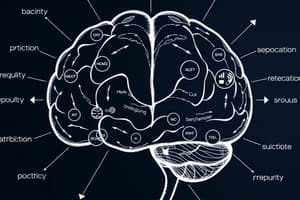Podcast
Questions and Answers
What is the difference between situational and dispositional attribution?
What is the difference between situational and dispositional attribution?
- Situational attribution analyzes a person's actions based on their situation. (correct)
- Situational attribution is based on personality traits.
- Dispositional attribution considers external circumstances.
- Dispositional attribution is about recognizing situational influences.
What is self-serving bias?
What is self-serving bias?
The tendency to make situational attributions for failures and dispositional attributions for successes.
What does the foot-in-the-door phenomenon refer to?
What does the foot-in-the-door phenomenon refer to?
The tendency to comply more readily with a large request after agreeing to a smaller one.
What is cognitive dissonance?
What is cognitive dissonance?
What was the focus of Solomon Asch's length of line experiment?
What was the focus of Solomon Asch's length of line experiment?
What did Milgram's obedience study investigate?
What did Milgram's obedience study investigate?
What is social facilitation?
What is social facilitation?
What is social loafing?
What is social loafing?
What is groupthink?
What is groupthink?
Flashcards are hidden until you start studying
Study Notes
Attribution in Psychology
- Situational Attribution: Analyzes a person's behavior based on the external context or situation.
- Dispositional Attribution: Judges behavior based on assumed internal traits or personality, often ignoring situational factors.
Self-Serving Bias
- Tendency to attribute failures to situational factors while attributing successes to personal factors.
- Example: Blaming a difficult test for failure while claiming personal knowledge for success.
Foot-in-the-Door Phenomenon
- Individuals are more likely to agree to a larger request after first agreeing to a smaller one.
- Example: Successfully asking a friend to help decorate 200 cupcakes after initially requesting a smaller task like shopping for ingredients.
Cognitive Dissonance
- Involves conflicting attitudes, beliefs, or behaviors causing discomfort.
- Individuals alter one of the conflicting components to reduce discomfort and restore balance.
- Example: A smoker knows smoking causes cancer and feels dissonance between behavior and cognition.
Solomon Asch's Line Experiment
- Designed to study the impact of social pressure on perceptions.
- About one-third of participants conformed to the majority's erroneous opinions.
Milgram's Obedience Study
- Explored the extent to which people follow authority, even to extreme actions.
- Findings suggested ordinary individuals could commit acts of violence when instructed by authority figures.
- Relevant to the Nuremberg Trials, where defendants claimed they were “just following orders.”
Social Facilitation
- The presence of others enhances individual performance on tasks.
Social Loafing
- Individuals tend to lessen their effort on tasks when they work in a group, leading to reduced performance standards.
Groupthink
- A phenomenon where group consensus overrides logical reasoning and critical analysis.
- Example: Ignored logical assessments regarding Iraq's weapons of mass destruction leading to the 2003 invasion based on flawed group consensus.
Studying That Suits You
Use AI to generate personalized quizzes and flashcards to suit your learning preferences.



